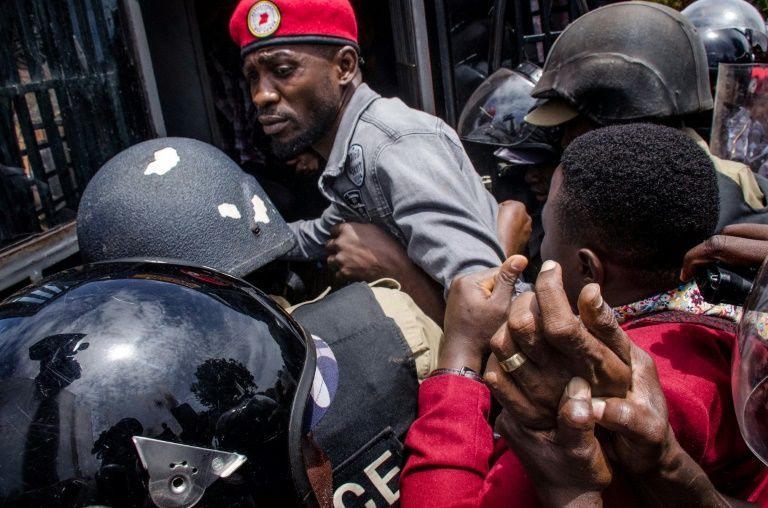Politics
Repressive Tactics used by Dictator Museveni to silence dissent and what activists have resorted to in Uganda.
What you need to know
“Activists in Uganda are increasingly recognizing the importance of exposing these enablers. By shining a light on the individuals who facilitate and execute Museveni’s oppressive tactics, activists aim to dismantle the system of impunity that allows such abuses to continue. This approach not only seeks to hold accountable those directly responsible for human rights violations but also challenges the broader power structures that sustain dictatorial rule.”

Yoweri Museveni’s authoritarian regime in Uganda has continued to systematically dismantle any form of dissent or opposition for over three decades. Museveni employs a range of repressive tactics designed to intimidate, silence and eliminate those who dare to criticize or oppose him.
Abductions carried out by security forces are commonplace, with critics of the regime seized from their homes or the streets, blindfolded and taken to undisclosed locations. In these ungazetted detention centers referred to as “safe houses”, detainees are subjected to torture and denied due process or access to lawyers and families. Some eventually resurface, dumped in remote areas, while many simply disappear without a trace an example is John Bosco Kibalama who was abducted on the 3rd of June 2019 and many others.
The use of unlawful detention is another key weapon for Museveni, who regularly has opposition leaders and activists unlawfully arrested and imprisoned for prolonged periods without trial. By locking up opponents indefinitely, the regime aims to weaken and fracture any organized resistance. Prominent opposition figures and academicians have found themselves thrown in jail on questionable charges.
Beyond detention, Museveni also ruthlessly clamps down on dissent through targeted killings and assassinations. Security operatives have shot opposition leaning prominent Ugandans in broad daylight and run vehicles of activists off the road. Homes of anti-regime lawyers and journalists have been raided by armed assailants resulting in point-blank murders. These violent silencing tactics instill deep fear across Ugandan society.
To try to evade accountability, Museveni relies on a network of enablers spread across the judiciary, security establishment, public sector and beyond. Complicit judges, officials, police chiefs and magistrates all play a role enacting the regime’s oppressive agenda through sham trials, trumped up charges, abductions, illegal detentions and more.
Police and soldiers carry out violent crackdowns on protests. Prison authorities hold detainees incommunicado and deny them due process. Together, these individuals form a machinery of oppression that ruthlessly crushes any challenge to Museveni’s authority.
Despite the grave risks, courageous activists continue exposing human rights abuses, building solidarity networks and using both legal means and civil disobedience to challenge the regime’s grip on power.
Human rights defenders and concerned civilians are documenting stories of torture and enforced disappearance, turning victims into symbols of resistance. Opposition leaders are calling for sanctions and travel bans against specific security officials complicit in abuses but most importantly against the man at the helm of all this, Museveni.
By targeting not just Museveni but also his lieutenants, activists are striking at the foundation of the regime’s repressive edifice. Their brave actions are leading to greater global solidarity, as international civil society groups amplify calls for accountability and governments face pressure to act against Museveni’s key henchmen.
With their focus on dismantling the structures and individuals propping up dictatorship, Ugandan activists offer hope for a future where impunity is replaced by justice. Our struggle is about more than just Museveni’s exit – it aims to build a Uganda where the human rights and civil liberties of all citizens are respected. Although the road ahead remains fraught with risks, these courageous voices show that even the most entrenched authoritarian systems are vulnerable when their victims unite to expose their abusers.
We there for call upon the entire human race globally to pay attention to what is happening in Uganda under Yoweri Museveni who captured power in 1986 through armed struggle and has clung onto power till to date by using the military to crush any opposition.
Museveni has gradually eroded democratic norms, removed term limits and age limits, and stifled any dissent in order to entrench his authoritarian rule. Ugandans have continued to pay a steep price as Museveni’s security apparatus abducts, tortures, detains and assassinates opposition voices with impunity.
The stories of victims like John Bosco Kibalama and many other disappeared Ugandans need to be heard. The voices of activists, opposition leaders, journalists and citizens being crushed by Museveni’s brutal machinery of oppression need to be amplified on the global stage.
Most of these Museveni repressive tactics were Cleary captured live on camera and documented well in the Bobi Wine the People’s president Documentary, a gripping documentary that chronicles the remarkable journey of Bobi Wine, a pop star-turned-politician, as he strives to dismantle Uganda’s brutal dictatorship under Museveni brutal rule. The film delves into the 2021 Ugandan presidential election, where Bobi Wine, alongside his wife Barbie, leads a courageous fight for freedom against President Museveni’s oppressive 35-year regime
It is high time the international community re-examined its ties with Museveni’s regime and took concrete action to stand with Ugandans yearning to be free of decades of dictatorship. With rising resistance and striving for change, Uganda needs solidarity from world leaders, civil society and human rights defenders in this difficult struggle.
Writer
Social Activit JBMuwonge
Email: contact.jbmuwonge.com